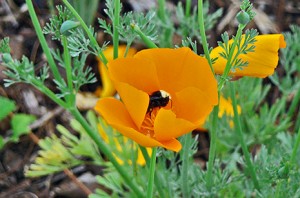
My husband is a math teacher, and I like to think he’s learned some things from talking to me about topics like intensive reading–he’s actually started a kind of reading database/blog for his community college students, because he’s come to the conclusion that improving their reading skills through pleasure reading would make doing both real-world math and school math easier for them. (Real-world math–things like a newspaper story on chances of the Iranian election shaving been rigged, or figuring out the best terms for a loan, or trying to understand the instructions for adjusting an injection, which I had to do last week–is all about reading information and figuring out what’s relevant, after all.) I’ve also had some interesting conversations with him about cross-cultural math (something that TESOL sometimes reports on), and his unusually enlightened college even had an English-Math interdisciplinary committee. My husband was so interested in seeing what he could get out of this kind of “cross-pollination” that he’s attended a couple of CATESOL and writing center conferences. So if you get the chance to peek into some other teaching field’s conferences, journals, or pedagogical conversations (literal or metaphorical), I really recommend it. Who knows what you might find out or be able to contribute? Chances are many of them are dying for a chance to talk to an ESL expert, as well!
I like to read the blogs at ScienceBlogs.com, and one recent post that reminded me of this cross-pollination principle is this “Interview with Stacy Baker.” She is a high school biology teacher and biologist who says, in the interview,
At the risk of upsetting the traditionalists, I believe there is total lunacy in allowing a person to teach science who has never actually practiced science. You can’t learn science by reading textbooks or taking educational methodology classes. Every science teacher needs to have the experience of participating in original research and they need to routinely refresh their skills.
Wow. You know, I’ve often said that I think nearly every aspect of our K-16 educational system in the US is broken, but this is an aspect I hadn’t though of before. I think she’s right! (Just as I think TESOL professionals who are native English speakers and not already multilingual really must seriously attempt to learn a second language, preferably a non-Western-European language.) But, of course, as she points out immediately, under our current system it’s pretty impractical, and with current budgets it veers into quixotic even if you think about special grants to give teachers this experience. In the long run, though, I wonder if we couldn’t remove a lot of the disconnect that I always perceived as a kid by somehow heading in this direction. What do you think? I had a couple of good science teachers, but on the whole it seems like it’d be better to have scientist-teachers, practitioner-teachers. It’s really weird to have non-practitioners teaching so many subjects…
Since I first started to learn about pedagogy as a discipline, it quickly became my firm belief that university professors in the United States are in dire need of it. Very few professors have any pedagogical training at all, either general or specific, and for a lot of them it shows. Some had a single class as a grad student, but that is totally insufficient for a career that is supposed to consist of teaching as well as writing and research–I realize some “R1” and other professors seem to resent the teaching aspect of their jobs, but who knows, maybe they’d resent it less if they had some idea of how to go about it. (Of course, a few are natural teachers–at least, for the natural learners in the class. Remember, if you’re a naturally academically inclined person, you can’t easily comment on whether someone is an effective teacher for those who really need it. This lesson took me a LONG time to learn during my MATESOL program, but I got it eventually! So I suspect that even many of the people I thought of as great teachers could have done with some pedagogical training.) K-12 teachers are far more likely to have pedagogical training, but 1) they often don’t have age- or subject-specific pedagogical training for all of the subjects and ages they’re teaching; 2) they’re often teaching a subject for which they don’t have subject-specific academic training; and 3) they are often teaching a subject in which they don’t have practical or research experience, as Stacy Baker mentions above. (Please forgive me for the general statements. I know it varies wildly by state and I fully admit that I haven’t taught K-12 in the US and don’t want to because it’s so challenging!)
Anyway, as you can see, despite originating in a science-teaching blog post, that got me thinking about all kinds of things. Have you learned anything from reading about teachers or teaching in other disciplines? Leave a comment and tell everyone about it!
Leave a Reply